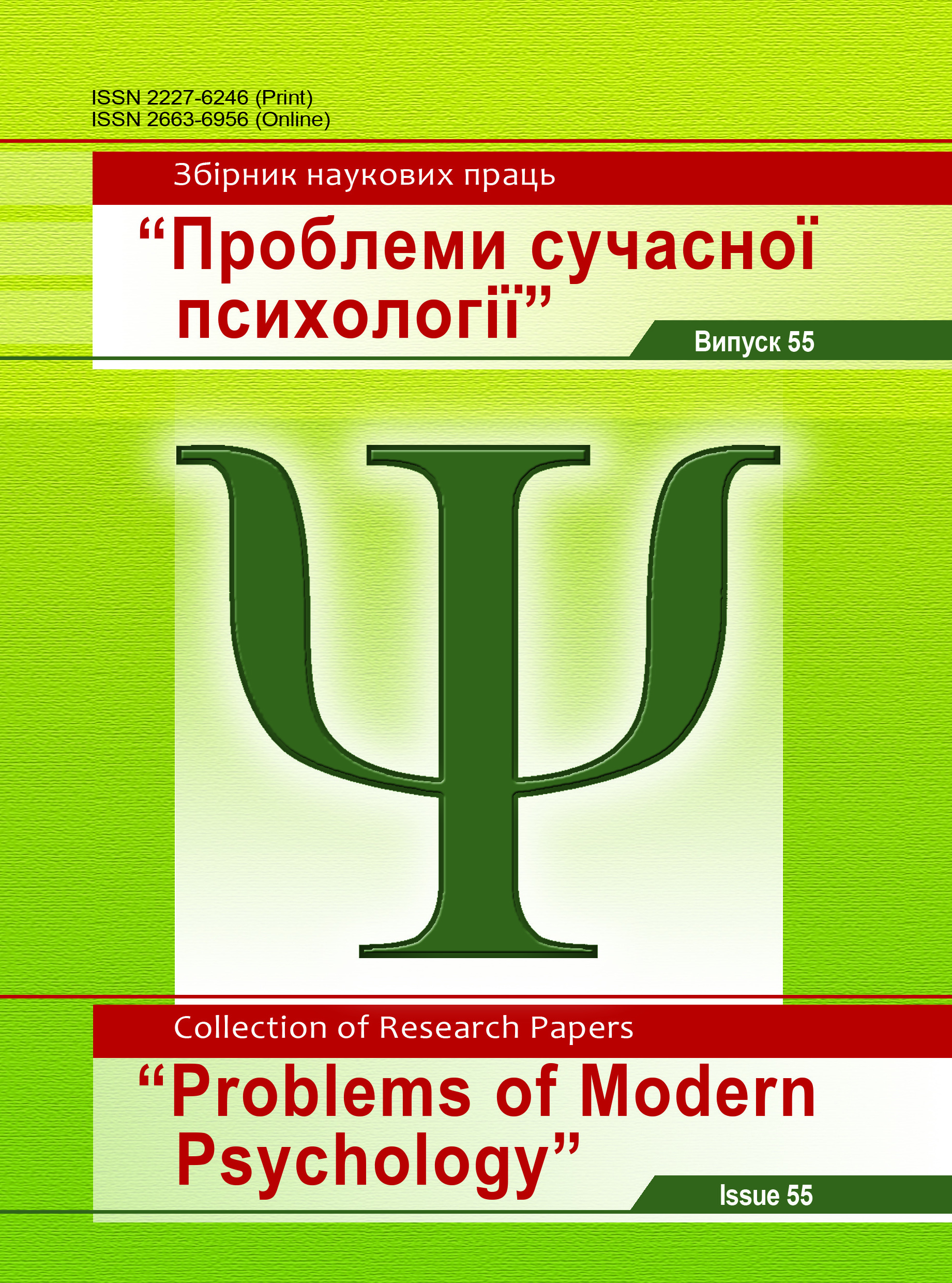The Positioning Different Types of Personality Resourcefulness in the Coordinates of "against-and-owing to"
DOI:
https://doi.org/10.32626/2227-6246.2022-55.173-193Keywords:
personality resourcefulness, richness of resourcefulness, psychological capital, trained resourcefulness, positioning of types of resourcefulnessAbstract
The aim of the article was to establish the nature of the relationship between the types of resourcefulness of a personality based on empirical data.
Methods. In the empirical study, the psychological survey methods were used, as well as mathematical and statistical methods of correlation, classification, discriminant, multifactorial, significative, comparative analysis. The empirical study is implemented in the Nelson's model, which makes it possible to describe the phenomenon under study under given conditions.
Research results. The indicators of comparability based on the results of the multivariate test of signification and comparative analysis using the Schef- fe's test justified are: value of oneself, freedom, responsibility. It should be noted that the empirical argumentation of hardiness as an indicator of comparability and a vector for positioning resource types is weak. Personality resourcefulness is different from other types resourcefulness in terms of the smallest share of representation in the volume of generalized resourcefulness and in the secondary importance of semantic significance. Resource richness is the least, and psychological resource is the most operationalized of the type from resourcefulness. Psychological capital is the most clearly expressed type of resourcefulness.
Conclusions. In the manifestation of the types of resourcefulness of the personality, the experience of overcoming difficult life situations is revealed, at the same time, the main thing is the experience of independent choice according to conscience, the freedom to take advantage of the opportunity to choose and responsibility for its consequences. Therefore, we conclude that the positioning of the types of psychological resourcefulness in the coordinates of "against-and- owing to" is carried out, to a large extent, owing to the individual's reliance on the ethical choice. Empirical comparison of types of resourcefulness according to reasonable indicators allows us to determine the nature of their relationship as a constellation - an ordered matrix of interrelated valuable issues. The applied significance of the positioning of types of resourcefulness lies in the opening possibility of predicting a change in the type of resourcefulness of a personality when choosing freedom and responsibility, as well as maintaining of him internal dialogue with conscience.
References
Grozinger, A., Wolff, S., & Ruf, P.J. (2022). The power of shared positivity: organizational psychological capital and firm performance during exogenous crises. Small Bus Econ., 58, 689-716. Retrieved from https://doi.org/10.1007/s11187-021-00506-4.
Hobfoll, Stevan E., Halbesleben, J., Neveu, J.-P., & Westman, M. (2018). Annual Review of Organizational Psychology and Organizational Behavior, 5 (1), 103-128. Retrieved from https://link.springer.com/article/10.1007/s11187-021-00506-4 .
Koriakina, Julia. (2015). Conditions for fulfilled life: description and measurement of existential motivations. National Psychological Journal, 4, 49-65. Retrieved from https://doi.org/10.11621/npj.2015.0404.
Kryvtsova, N.V., & Biron, B.V. (2019). Rol vidchuttia koherentsii u zrostan- ni resursnosti osobystosti ta rivniv samoefektyvnostii [The role of a sense of coherence in the growth of personal resources and levels of self-efficacy]. Science and Education. A New Dimension. Pedagogy and Psychology, 79 (197), 70-73. Retrieved from https://repo.odmu.edu.ua:443/xmlui/handle/123456789/9719 [in Ukrainian].
Langle, A., Orgler, Ch., & Kundi, M. (2003). The Existence Scale. A new approach to assess the ability to find personal meaning in life and to reach existential fulfilment. European Psychotherapy, 4 (1), 135-151. Retrived from https://www.existenzanalyse.org/wp-content/uploads/ESK-Article-EP2003.pdf.
Sadeghpour, M., Fereydooni-Moghadam, M., & Namnabati, M. (2021). The Impact of Kobasa and Maddi Hardiness Model on Stress and Hardiness of Iranian Pediatric Nurses: A Clinical Trial Study. Iranian journal of nursing and midwifery research, 26(1), 42-46. Retrieved from https://doi.org/10.4103/ijnmr.IJNMR_128_20.
Savchin, M. (2016). Personality abilities [Personality abilities]. Kyiv: “Academy” [in Ukrainian].
Shtepa, O. (2020). Resursna nasychenist osobystosti [Resource richness of personality]. Zbirnyk naukovykh prats «Problemy suchasnoi psy- kholohii» - Collection of research papers “Problems of modern psychology” , 47, 231-252. Retrieved from https://doi.org/10.32626/2227-6246.2020-47.231-252 [in Ukrainian].
Shtepa, O.S. (2018). Opytuvalnyk psykholohichnoi resursnosti osobystosti: rezultaty rozrobky i aprobatsii avtorskoi metodyky [Questionnaire of psychological resource personality: results of development and testing of the author’s method]. Zbirnyk naukovykh prats «Problemy suchasnoi psykholohii» - Collection of research papers “Problems of modern psychology”, 39, 380-399. Retrieved from http://nbuv.gov.ua/UJRN/Pspl_2018_39_33 [in Ukrainian].
Downloads
Published
How to Cite
Issue
Section
License
Copyright (c) 2022 Shtepa Olena

This work is licensed under a Creative Commons Attribution-NonCommercial 4.0 International License.
Copyright
The Editorial Board has the full right to publish original scientific papers containing results of theoretical and experimental research works which are not currently subject to review for publication in other scientific editions. The Author shall transfer to the editorial board of the Collection the right to spread the electronic version of the paper, as well as the electronic version of the paper translated into English (for papers originally submitted in Ukrainian and Russian) by all kinds of electronic means (placement at the official website of the Collection, electronic databases, repositories etc).
The Author of an article reserves the right to use materials of the paper, without approval with the editorial board and the founders of this Collection: a) partially or fully, for educational purposes; b) for writing own dissertation papers; c) for preparation of abstracts, conference reports and presentations.
The Author of an article can place electronic copies of the paper (including the final electronic version downloaded from the official website of the Collection) at:
- personal web resources of all Authors (websites, webpages, blogs etc.);
- web resources of the institutions where the Authors are employed (including electronic institutional repositories);
- non-profit public access web resources (for example, arXiv.org).
But in all cases, it is obligatory to have a bibliographic reference to the paper, or a hyperlink to its electronic copy placed at the official website of this Collection.






